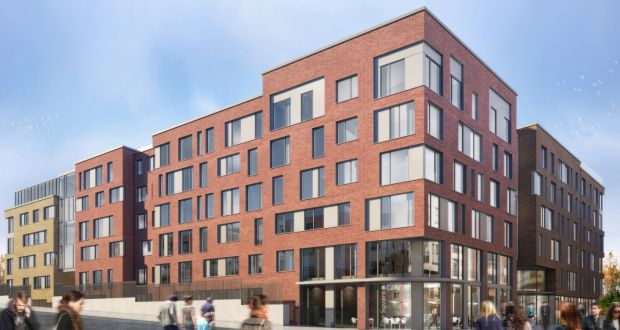When the Global Room announced that Trinity’s Accommodation Office had negotiated exclusive contracts for the newly established student property Kavanagh Court, it felt like a relief for many international students. Trinity had finally seemed to meet the desperate accommodation demand from overseas.
Since the arrival of Kavanagh Court’s first students, three weeks have passed and it seems like the Accommodation Office in association with the Global Room has achieved its goal to provide “secure and reliable homes” for Trinity students.
International student liaison officer Colum Cronin tells The University Times: “This year it felt like we needed additional space for students, especially for students coming outside of Europe like China, India or the US.”
This concern led to the decision to negotiate exclusive contracts for Trinity students to stay in Kavanagh Court, which is named after the famous Irish novelist and poet Patrick Kavanagh.
Kavanagh Court undoubtedly delivers high-quality student housing. The rooms in the complex, which is owned by international accommodation network Uninest, are sleek, modern and functional, with space for a desk and clothes storage. Included in the €956 per month that the first students paid for their room is a gym, a study room, a games room and a cinema room.
Uninest provides high-end student accommodation complexes in six different countries, with 30 different student complexes. Its complexes operate in small student towns like Münster, located in western Germany, and in major international cities, such as Dubai and Melbourne.
In Dublin, Uninest operates three complexes: New Mill, Broadstone Hall and Kavanagh Court. With just under 900 beds in the city now, Uninest plans to bring that number up to 5,000 beds by 2020.
Its policy and reason for such successful expansion is to be professional at every stage and provide a high-end service above and beyond the usual student accommodation. Speaking to The University Times, resident of Kavanagh Court and marketing student, Furkan Yavuz says: “I lived at three different student accommodations in the UK and personally, arriving at Kavanagh Court was better than I expected. So far this is the best experience I ever had.”
Furthermore, German student Alina Gehrels, who arrived at Kavanagh Court two weeks after it opened, mentions: “I had struggles with my former accommodation and I needed a good and quick solution. It was very easy to arrange living at Kavanagh Court and everything was prepared when I arrived.”
The main challenge for Uninest is to find enough students willing to pay the high prices for their ensuite rooms. Christopher Curtis, the Uninest student co-ordinator at Kavanagh Court, explains to The University Times that times have changed dramatically and nowadays “students arrive with standards and are not satisfied with poor rooms”. However, despite the high demand among Trinity students for accommodation, Kavanagh Court is still not full. There is a noticeable lack of Irish students in the Uninest accommodation, with it largely dominated by international students, who appear more willing to pay the expensive prices.
With the majority of students all satisfied with their rooms and service, the only recorded issue of concern was that the price has been dropped from €956 per month down to €860, exclusive to incoming students only. The new deal does not affect students who are already in Kavanagh Court and are tied into their €956-per-month contracts.
This unsurprisingly led to questions being asked of the Trinity decision-making process, as it was held as unfair that some students would have to pay more than others for the exact same facilities. Cronin said that the anger among students is understandable and that “a lesson will be learnt from it”.
Although Uninest, and in particular Kavanagh Court, fulfils its promises to “not only be a student accommodation but a home”, there have been concerns that the high concentration of international students and the distance from campus may lead to a lack of identification with the Trinity community and Irish culture.
For many international students though, Kavanagh Court was their only option for appropriate accommodation in the city. “Very soon it was clear that I would go to Kavanagh Court”, Furkan says. “I was rejected, amongst many others, to live on-campus and as I don’t know any people in Dublin it was impossible to try and fix an apartment from abroad.”
Cronin states that from the very beginning, it was the aim to unite Irish and international students at Kavanagh Court, but that it is also true that Kavanagh Court was mainly seen as the answer for international students.
In fact, two thirds of the Kavanagh Court applicants were international students and one third domestic students. How many Irish students finally end up at Kavanagh Court is unclear. However, one future aim is to make Kavanagh Court more attractive for domestic students. The idea is for second-year students who leave Trinity Hall but still want to live with their community and within 20 minutes of campus to move there.
In contrast, Dillan O’Keeffe, a student from the UK, states to The University Times that he doesn’t see a separation between Kavanagh Court and the Trinity community: “Because of the very central location of Kavanagh Court, it is very easy to just go out and meet Irish people at the Pavilion Bar or elsewhere at Trinity facilities.”
Overall, the integration process among international students from Kavanagh Court has worked well. For the Global Room, Kavanagh Court was “a step in the right direction”. A few intercultural dinners were held, as well as Meet & Greet weekend events, which are open to all Trinity students and are often well attended.
Relationships between Irish students and internationals are slowly but successfully being built, whether in classes, societies or sports clubs. In time, with perhaps more price cuts, there will be more of an Irish presence in Kavanagh Court.







